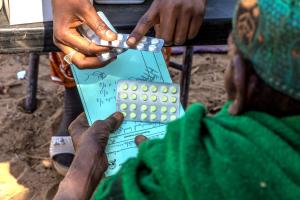WHO supports Angola in strengthening the regulation of medicines and health technologies
Access to safe, effective, and quality medicines and health technologies is one of the fundamental pillars for ensuring public health and achieving Universal Health Coverage. In Angola, this goal is being achieved through a structured process of institutional strengthening, led by the Regulatory Agency for Medicines and Health Technologies (ARMED) with ongoing technical support from the World Health Organization (WHO), co-financed by the European Union.
Since 2022, the WHO has provided technical and financial assistance for the implementation of ARMED's Institutional Development Plan (IDP). This plan was designed as a strategic tool to modernize the national regulatory system, introducing internationally recognized standards aligned with global best practices in the regulation of medicines and medical products.
In September, for three weeks, the WHO provided international technical consultancy to work with ARMED on the process of implementing the technical recommendations from previous sessions, monitoring the progress of key regulatory functions. The work also included training activities and the design of a roadmap for the rest of the year. The feedback session led by ARMED Deputy Director General Dr. José Lumbo was attended by the institution’s managers and senior staff and the WHO Representative in Angola, Dr. Indrajit Hazarika.
The commitment is ambitious: by the end of 2027, Angola aims to achieve level 3 regulatory maturity. This level ensures that the country has functional mechanisms in place to evaluate, authorize, and monitor medicines and health technologies with proven quality, safety, and efficacy. Currently, only eight countries across the African continent have reached this level, and none of them are Portuguese-speaking. This path puts Angola in a unique position to become a pioneer among Portuguese-speaking countries in Africa.
Among the priorities are strengthening national pharmaceutical policy to ensure greater consistency and transparency in decision-making; ensuring that medicines and health technologies on the Angolan market comply with international quality and safety standards; developing the capacity of the National Laboratory for Quality Control of Medicines; strengthening public health protection by reducing risks associated with counterfeit or low-quality medicines; ensuring timely access to innovative and essential health technologies to respond to epidemic outbreaks, chronic diseases, and other emerging needs.
For the WHO, this process has a direct impact on the lives of the population. “A robust regulatory system is essential to ensure that all citizens have access to safe and effective medicines. This is a strategic step towards strengthening Angolans' confidence in the health system,” said Dr. Indrajit Hazarika, WHO Representative in Angola.
Angola's progress in this sector contributes to ensuring healthy lives and promoting well-being for all at all ages. It also reinforces the country's role in the African health agenda, positioning Angola as an example of resilience, political commitment, and regulatory innovation.
With the commitment of all institutional levels, Angola could reach a historic milestone in 2027. Achieving level 3 regulatory maturity will not only be a national achievement, but also a legacy for the region and a decisive step towards a more equitable, safe, and sustainable health system. Level 3 maturity of national regulatory capacity will facilitate the creation of a favorable environment in Angola for investment and local industrial production of medicines and medical products, with ARMED certification.
